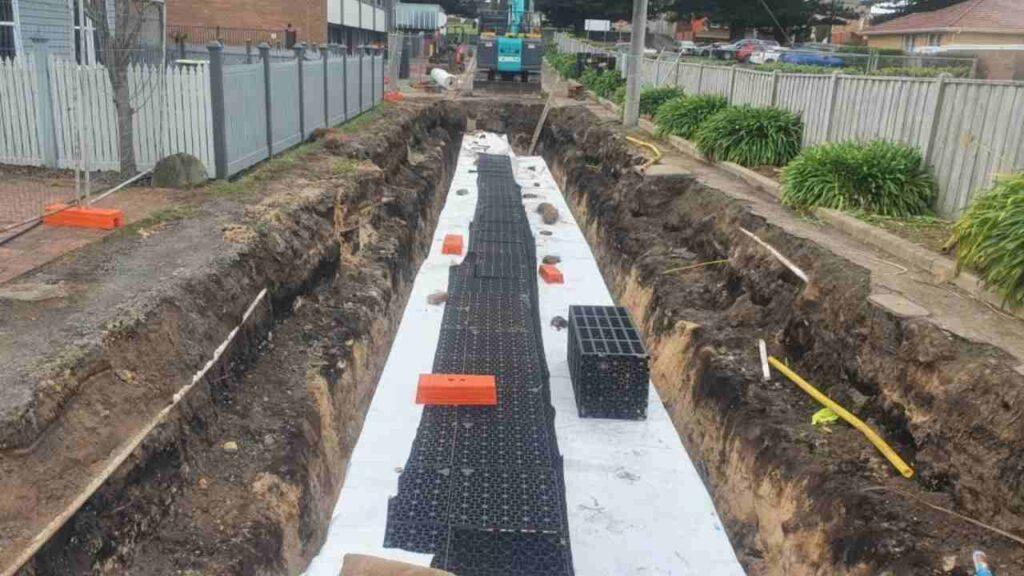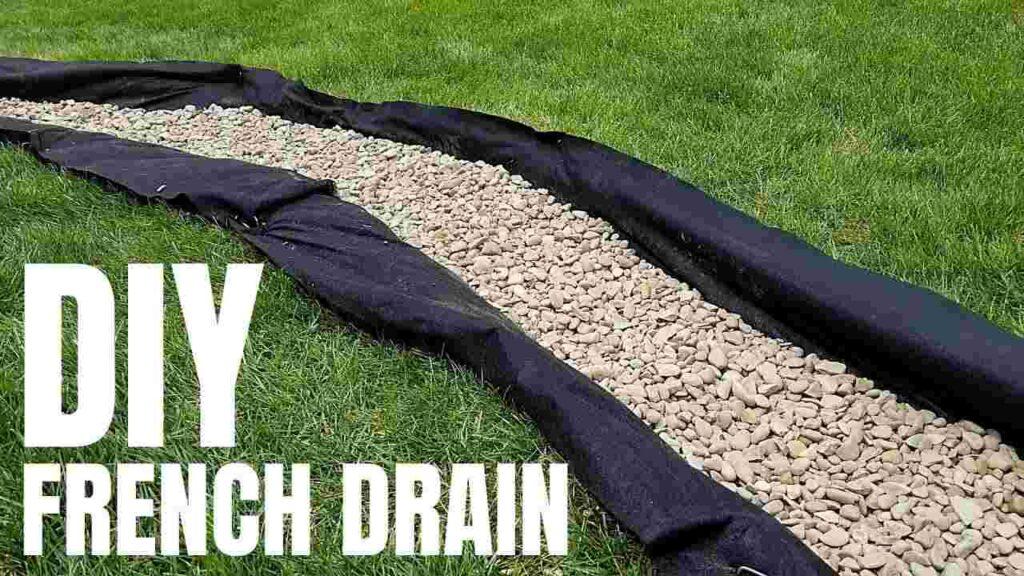When it comes to maintaining a healthy and safe home, proper drainage is essential for residential properties. Without it, you could face issues like water pooling in your yard, foundation damage, or even basement flooding. The good news is, there are a variety of drainage solutions available to prevent these problems. Choosing the right drainage system can protect your home’s structure, keep your lawn healthy, and even improve your property value. Whether you’re dealing with occasional pooling or persistent water issues, finding the best drainage solution can make all the difference in maintaining your property. In this guide and with the help of Liberty Heritage Nursery Farm, we will explore different drainage options, their benefits, and how to determine which solution is best suited for your specific needs.

From French drains to dry wells and downspout extensions, each option serves a specific purpose depending on your property’s layout and water flow patterns. French drains are ideal for redirecting surface and groundwater away from your home, while dry wells help absorb excess water into the ground. Downspout extensions ensure rainwater is safely diverted away from your foundation, preventing erosion and flooding. Professional drainage solution services can assess your unique situation, recommend the best system for your property, and handle installation to protect your home from water damage.
Understanding the Importance of Proper Drainage
Proper drainage is critical to maintaining a healthy home and yard. Without it, common drainage problems like water pooling in low-lying areas, soil erosion, structural damage, and potential flooding can occur. Excess moisture can weaken your home’s foundation, warp wooden structures, and create a breeding ground for mold and mildew. It also negatively impacts your lawn and landscaping, leading to dead grass, soggy soil, and insect infestations. By installing an effective drainage system, you address these issues and protect your home’s structural integrity, reducing the risk of costly repairs down the road. Additionally, good drainage helps preserve your lawn and gardens, ensuring your outdoor spaces remain vibrant and usable. Addressing drainage issues proactively can save you headaches and protect your property investment in the long run.
Signs Your Property Needs a Drainage Solution
There are several warning signs that indicate your property may need a drainage solution. Water pooling in your yard after rain is a clear indicator, especially if the water remains stagnant for days. Other signs include foundation cracks, mold growth in the basement or crawl spaces, and musty odors inside the home. You may also notice erosion or washed-out areas in your yard, or even waterlogged soil that never seems to dry. Puddles near your home’s foundation are particularly concerning, as they can lead to basement flooding or foundation weakening. If your downspouts aren’t effectively channeling water away from your house, it’s time to consider installing a proper drainage system. While costs associated with landscape drainage solutions can vary, investing in effective drainage will prevent further damage and long-term expenses.
How Drainage Issues Impact Home Safety and Value
Drainage issues can pose serious risks to your home’s safety and value. When water isn’t properly diverted, it can lead to soil erosion, compromising the stability of your home’s foundation. This can cause foundation cracks, which might result in costly repairs and, in severe cases, structural failure. Water accumulation around your home can also cause moisture damage, promoting mold growth that harms air quality and threatens the health of your family. If you notice poor drainage in your yard, such as persistent water pooling or soggy areas, it’s important to address these issues promptly. The value of your home is directly impacted by these problems; potential buyers are likely to be deterred by signs of water damage or foundation issues. By addressing drainage problems early, you safeguard your home’s value and ensure long-term safety.
French Drains: An Effective Solution for Groundwater
French drains are a highly effective solution for managing groundwater and preventing it from seeping into unwanted areas. This drainage system consists of a perforated pipe placed in a trench filled with gravel, which helps guide water away from your home’s foundation or low-lying areas of your yard. The gravel and pipe combination efficiently collects and redirects excess water to a designated area, such as a storm drain or dry well. French drains are especially useful in areas prone to heavy rainfall or where the ground tends to retain water. When professionally installed, they help prevent erosion, protect your foundation, and keep your yard dry, making them a popular choice for many homeowners.

The Role of Dry Wells in Residential Drainage
Dry wells are another effective drainage solution for residential properties, especially for managing runoff from roofs, driveways, and other impermeable surfaces. A dry well is an underground structure that collects excess water and allows it to slowly seep into the surrounding soil. This prevents water from pooling on the surface and reduces the risk of flooding. Dry wells are often used in conjunction with downspout extensions or French drains to handle large volumes of water. They are ideal for properties with limited space or where it’s difficult to direct water away from the home. When installed correctly, dry wells help manage stormwater and maintain the structural integrity of your property.
Downspout Extensions and Their Benefits
Downspout extensions are simple yet effective components of a drainage system. They extend the reach of your gutter system, ensuring that rainwater is directed well away from your home’s foundation. Without proper extensions, water discharged by gutters can pool near your foundation, leading to basement leaks, foundation damage, and soil erosion. Downspout extensions are inexpensive and easy to install, but their benefits are significant. They prevent water from damaging your landscaping, reduce the risk of foundation problems, and help protect your home from flooding. By guiding rainwater away from your home, these extensions play a crucial role in maintaining the long-term health of your property.
Choosing the Right Drainage System for Your Property
Choosing the right drainage system depends on your property’s specific needs and conditions. Factors like soil type, slope, and water flow patterns play a major role in determining the most suitable solution. For areas with standing water or where the ground is saturated, a French drain might be the best option. On properties with heavy roof runoff, downspout extensions combined with a dry well could be ideal. If you have more complex issues, such as recurring basement flooding or significant erosion, you may need a more comprehensive system involving multiple components. Consulting with a professional drainage solution service can help you assess your property and select the system that offers the best protection.
Comparing Different Drainage Solutions
When comparing different drainage solutions, it’s important to consider the specific problem you’re facing, the installation process, and long-term maintenance requirements. French drains are excellent for managing groundwater but may require significant excavation. Dry wells are great for absorbing large amounts of water from rooftops but need regular maintenance to prevent clogging. Downspout extensions are easy to install and maintain but may need adjustments over time to ensure proper water flow. Each solution offers unique benefits depending on your situation. A professional drainage service can guide you through the pros and cons of each system and help you choose the one that best addresses your property’s needs.
Professional Drainage Solution Services: Why They Matter
Professional drainage solution services are invaluable when dealing with water management on your property. While some homeowners may attempt DIY solutions, hiring a professional ensures that the drainage system is properly designed and installed to meet local codes and site-specific needs. Experts can assess your property’s unique water flow patterns and recommend the most effective solutions, whether that’s a French drain, dry well, or another system. They have the tools, experience, and knowledge to prevent future issues like flooding, foundation damage, or erosion. Moreover, professional services often come with warranties, giving you peace of mind that your investment in drainage protection is safeguarded for years to come.
DIY vs. Hiring a Professional for Drainage Installations
When deciding between DIY or hiring a professional for drainage installations, it’s important to consider the complexity of the project and your skill level. Small fixes like installing downspout extensions can be manageable for a DIY enthusiast, but larger projects such as installing French drains or dry wells require expertise in excavation, grading, and water flow management. Improper installation can lead to ineffective drainage or even damage your property further. Professionals not only have the necessary tools and experience, but they can also offer customized solutions tailored to your property. While DIY might save money upfront, professional installation often results in a more durable and long-lasting drainage system.
Maintenance Tips for Your Residential Drainage System
Regular maintenance is key to ensuring that your residential drainage system continues to function effectively. For French drains, it’s important to check for blockages in the perforated pipe or gravel and remove any debris that might hinder water flow. Dry wells should be inspected periodically to ensure they aren’t filled with sediment or debris, which can reduce their ability to absorb water. Downspout extensions need to be kept free of leaves and other obstructions that could prevent proper water discharge. Scheduling routine inspections with a professional drainage service can help identify potential issues early, preventing costly repairs and ensuring your system protects your property year-round.
Conclusion
In conclusion, addressing drainage issues on your residential property is essential for protecting your home’s structural integrity, preventing water damage, and maintaining a healthy outdoor environment. Whether through French drains, dry wells, downspout extensions, or a combination of solutions, finding the right system depends on your property’s unique characteristics and needs. Professional drainage services play a critical role in ensuring that the system is installed correctly and functions optimally over time. Regular maintenance is also crucial to prevent clogs and ensure continued efficiency. By investing in proper drainage solutions, you not only safeguard your property from potential water-related damage but also enhance its value and longevity, making it a vital step in responsible home ownership.
FAQs
What is the best drainage solution for managing excess water in my yard?
The best solution depends on your property’s layout, but French drains or dry wells are often effective for managing excess water.
How do I know if my property needs a drainage system?
Signs include water pooling in your yard, foundation cracks, or mold in your basement or crawl spaces.
Can I install a drainage system myself?
Simple solutions like downspout extensions can be DIY, but complex systems like French drains are best left to professionals.
How often should I maintain my drainage system?
Regular inspections and maintenance are recommended yearly, or after heavy storms, to ensure the system works properly.
Will installing a drainage system increase my property value?
Yes, proper drainage protects your home from damage, which can boost its value and appeal to potential buyers.
